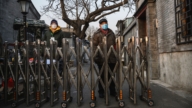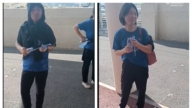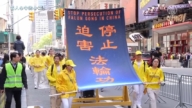【新唐人2013年06月04日讯】根据中国大陆一项调查显示,中国大陆只有三分之一的市民,说得出自己所居住城市市长的名字,但其中却有超过一半的人表示,如果有直选,他们仍然会投票选出现在的市长。这项调查数据听起来有些自相矛盾。有学者表示,这项调查本身就很滑稽,大家只把它当作一个玩笑,不会当真。为什么会这样呢?一起来看看。
这项由中国“零点研究咨询集团”1月份进行的调查,在30个主要城市进行,其中,拉萨不在调查范围之内。
据《法国国际广播电台》报导,接受意见调查的市民,必须是拥有本市户籍的长期居民,年龄介乎18至60岁。接受意见调查的总共有6300人。
调查显示,约有52%的市民说,如果当地市长可以直选,他们会投票支持现在的市长,不过,他们当中只有32%的人能够说得出市长的名字。
深圳当代社会观察研究所所长刘开明:“这个问题本身就很滑稽,因为在目前我们看不到(有直选可能)。所以对这样没有意义的假设,大家也就不会很认真的把它当回事。现在就把这个作为一个玩笑了,所以回答的时候也是玩笑了。”
上海市民殷先生:“很矛盾的,它吹牛,吹牛又不能自圆其说的结果,肯定是这样的。没多大意义的,你相信这些调查的话有意义吗?”
对于这个现象,香港《南华早报》引述北京律师陈永苗的话指出,这反映了只要政府当局不去骚扰人民的正常生活,大陆人普遍都是各扫门前雪。陈永苗说,人民对政治的冷漠,其中一个原因是,言论和示威自由长期以来受到压制。
四川成都市民、独立参选人王慧:“我个人认为,第一个,很多人自己的合法权益没有受到侵害的时候,他不太注重这些东西﹔第二个原因,他有可能没有去在意这些问题。”
深圳当代社会观察研究所所长刘开明认为,“零点研究咨询集团”做调查的这个行为应该是真实的,但是否会得到老百姓的真实回答,以及反映他们的真实意愿,那就很难说了。
刘开明:“中国人当面对镜头采访时,一般是力争正确的答案。那么什么是正确答案呢?首先是最安全答案才是正确答案、对自己没有危害的答案。”
根据调查,对于市民的支持度,最差的3位市长是:上海市长杨雄、哈尔滨市长宋希斌,以及重庆市长黄奇帆。
刘开明:“他的所作所为,我们对他并没有监督权、约束权。这样的话,大家并不会觉得市长跟我们有什么关系。这个市长做得好,我们感谢老天爷,我们中了个彩。做得不好,我们只能祈祷他早点离开。”
上海市民殷先生表示,如果自己有选举权,绝对不会投票给现在的市长。
上海市民殷先生:“我不会、绝对不会的,因为共产党的干部他不是凭自己的能力坐到这个位置上。这么多年治理国家、城市也好,没有一个地方治理得好。那为什么还要选他呢?”
而重庆市民王耀明则指出,在没有公开、透明、真正意义上的自由选举的情况下,市长和民众没有直接的关联。那些表面上看着是为民生做事的市长,出发点和最终目地都不是为了老百姓。
重庆市民王耀明:“我对整体都不满意,对他(现任市长)肯定也没有什么好的(印象)。直选在我们这个社会还做不起来。代表民意基本上不太可能。”
王耀明表示,经过重庆王薄事件后,大家对中共这个体制都不感兴趣。而黄奇帆本身又是左右逢源的和事佬,大家都看不惯他。
采访/易如 编辑/王子琦 后制/李若琳
Poll With Contradictory Results: Questions If China Had Direct Election
A recent survey shows that only a third of
Chinese residents can name their local mayors.
However, over half of them would still vote for the
incumbent mayors, if a direct election was held.
This result sounds somewhat contradictory.
Some scholars indicate that it was a ridiculous
survey in itself, so no one really takes it seriously.
Why did this happen? Let’s see our news coverage.
The poll was conducted in January by
the Horizon Research Consultancy Group.
It took place in30 major cities in China,
although Lhasa was excluded from the survey.
Radio France Internationale reported that
the interviewees were required to hold local
permanent residency, aged between 18-60.
The survey reportedly interviewed a total of 6,300 people.
The poll shows that about 52% respondents
said that they would still vote for the
existing mayor, if a direct election was held.
Yet, only 32% of them can name their local mayors.
Liu Kaiming, Director of a civil think tank, Shenzhen:
“The survey itself is absurd, as currently
direct election hasn’t existed in China.
So it’s pointless to make such an assumption, and nobody
can really take it seriously. They just replied for fun.”
Mr. Yin, Shanghai citizen: “It was very contradictory.
They exaggerate things all the times, untruthful.
It made no sense, so can you
really find the survey meaningful?”
Hong Kong’s South China Morning Post quoted
Chen Yongmiao, a Beijing-based lawyer.
Chen said the findings implied that mainlanders
tend to mind their own business, as long as
the authorities do not disrupt their lives.
Chen added that such political indifference
was also tied to the suppression of freedom
of speech and freedom to demonstrate.
Wang Hui, Chengdu citizen, independent candidate:
“I think that firstly, a lot of people don’t care about voting,
if their legal rights are not infringed.
Secondly, they simply didn’t take the questions seriously.”
Liu Kaiming remarks that the Horizon
Research survey seems to be real.
However, whether it can get ordinary
people’s real voice, that’s hard to say.
Liu Kaiming: “During on-camera interviews,
Chinese generally try to answer “correctly”.
What’s the correct answer? The safest
one that won’t get him into trouble.”
The survey indicates public support for mayors.
The worst three mayors were Yang Xiong,
Shanghai mayor, Song Xibin, Harbin mayor,
and Huang Qifan, Chongqing mayor.
Liu Kaiming: “In China, citizens have
no rights to oversee local mayors.
So everyone feels that mayors have nothing to do with them.
If the mayor is good, we thank the Heaven,
if not, we can only pray that he leaves early.”
Mr. Yin says that if he has the right to vote,
he won’t vote for the incumbent mayor.
Mr. Yin: “I won’t vote for him, definitely.
Because the communist party’s cadres have
never got their posts through competency.
For decades, none of the regions in China have
seen good governance. Why shall I still vote for him?”
Wang Yaoming, a Chongqing citizen, commented.
He says that without an open, transparent,
and truly free election, the mayor and
the people have no direct ties.
In his view, those mayors who seemingly advocate
on behalf of livelihood don’t really serve the people.
Wang Yaoming: “I’m not satisfied with
the government as a whole, nor do I have
any good opinion on the current mayor.
Direct election isn’t likely in our society at the moment.
Nor is the election of candidates
who can really represent the people.”
Wang Yaoming reveals that since the incidents of
Wang Lijun and Bo Xilai broke out in Chongqing,
the public have no longer seen the importance of
the CCP’s appointment of officials.
Huang Qifan is deemed a “fence-straddler”,
who butters his bread on both sides.
He has been frowned upon by local people.


























